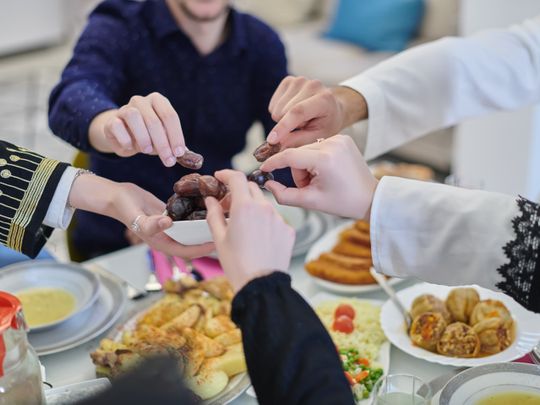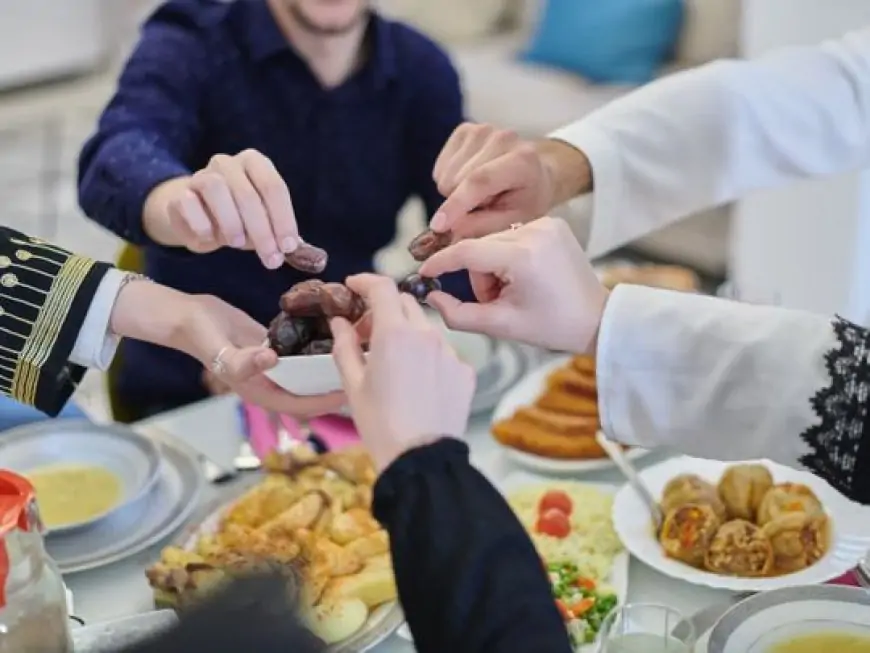
Dubai: UAE doctors have cautioned patients who have recovered from COVID-19 to be mindful of their nutrition, hydration, sleep and physical fitness if they plan to observe the fast during Ramadan.
International medical journals and organsiations such as the Centre for Disease Control (CDC) have warned that even two to three months after recovery, long-haul patients of COVID-19 are likely to suffer from several symptoms such as fatigue, breathlessness, poor muscle tone, threats of blood clots and brain fogging among other side-effects.
Take the case of Mohammad Kunhi Siddiqui, 58, an Indian expatriate businessman in Dubai who recovered in February and was planning to observe the fast during Ramadan. He told Gulf News: “I suffered from many complications, including pneumonia, and had to be put on a mechanical ventilation. It’s been almost two months since I recovered and I still feel very fatigued and tired. But I am determined to observe the fast and recently went to get a thorough check up from my treating physician, Dr Salvin George, specialist internal medicine, at Medcare Hospital Dubai. He has reassured me that under medical supervision I can fast.”
Explaining the potential of health risks of fasting for those who have recovered from COVID-19 complications, Dr George said: “Recovery for critical COVID-19 patients is gradual and they are advised to observe the fast under medical supervision. Many critically ill COVID patients continue to experience fatigue, tiredness, respiratory infections, breathing trouble. Such patients are not advised to fast, while others who had moderate-to-mild symptoms can go ahead. There is a threat of blood clots as well and sometimes fasting that can trigger dehydration can cause blood to get thicker and result in clots. We typically prescribe most seriously ill patients blood thinners for a month after discharge."
He added: “If these patients still plan to fast, we advise them to undergo the D-dimer test. This is a test can rule out any inappropriate blood clots. If the reading is below 0.5, the patient’s blood is sufficiently thin. However, if the reading shows 1 or more than 1 then the patient has a chance of getting blood clots and needs thinners and must be mindful of proper hydration during the fast.”
Dr Sarla Kumari, specialist Internal Medicine at the Canadian Specialist Hospital, Dubai, explained that those who had mild COVID-19 and had no major health threats were fine to fast during Ramadan. “There is no evidence to suggest an adverse effect from fasting during the COVID-19 pandemic on asymptomatic, healthy individuals who have previously fasted safely. However, patients with fever and prolonged illness secondary to COVID-19 can become severely dehydrated and are at risk of sudden acute deterioration. As such, these patients should not fast (or cease fasting) and ensure adequate hydration. Prior to commencing fasting, any comorbidities need to be risk stratified and discussed with the patient’s clinician.”
Dr Kumari explained, “The majority of COVID-19 infections either do not produce any symptoms or cause a self-limiting flu-like illness, whilst up to 20 per cent can cause severe or critical illness. People with mild illness with no other medical condition can fast. However, if they feel sick or have fever then they need to stop fasting.”
Long-haul COVID-19 patients need to take care of choosing suhour and iftar food that is balanced in nutrition, provides ample macro and micronutrients. They must stay hydrated throughout the day, do mild-to-moderate exercise once they end the fast for the day and must make sure they get at least nine hours of sleep each day.
Why is water intake so important for post-COVID patients?
Juliot Vinolia, clinical dietician and consultant nutritionist at Medeor Hospital elaborated: “Unlike the regular fasting diets, Ramadan fasting involves the withdrawal of both food and water, Therefore, dehydration risks should be mindfully managed. Post-COVID patients must take extra precaution in staying well-hydrated during Ramadan and at all times. “
She further explained: “Individuals who suffered from very serious impact of the virus experience a cytokine storm (where the body’s immune cells turn rouge and begin attacking the healthy cells). This increases the inflammatory and blood clotting factors in the body. Dehydration further complicates the side effects of the inflammatory response of an active virus or vaccine.
Dehydration makes you infection prone
“The eyes, nose, mouth and gut are the entry zones for viruses and other pathogens. Dehydration makes our body’s protective barriers like the mucosal lining very dry and it is easier for the pathogens to easily cling on to dry surface and travel deep into our body and multiply. This also is the reason behind increase in gastrointestinal infections among people eating more outside food during humid summers with heat-resistant thermophilic bacteria.
Proper hydration outside fasting hours can keep our body’s first line of defence strong against the invasion of pathogens, while following good hygiene practices.”
Consume water and fibre-rich food
Vinolia explained. “While the dense carbs such as whole grains, legumes and pulses are a good source of micro and macro nutrition, water-rich berries, vegetables and fruit will add more water-content to the body. The fibre-rich, non-processed food items will help hold water in the body which will be of great help to post COVID-19 patients observing the fast.”
Keep up with your circadian rhythms
Circadian rhythms refer to the syncing of the human body and other living organisms to sunrise and sunset. When we keep awake during the night and sleep during the day, that disrupts the natural rhythm and affects the metabolism, hormonal impact on body’s processes and weakens our immunity. That is why Dr George advises post-COVID patients to catch up on their sleep. “In UAE, residents most sleep for five-seven hours day. I advise all COVID-19 patients in general, to sleep at least two hours more than this, to accelerate healing and rejuvenation. They can follow this sleeping pattern even during Ramadan and not stay awake through the night.”
Boost your immune system
Post-COVID patients who are fasting during Ramadan, need to follow the following guidelines:
No matter what variant of the virus the efficacy of one’s immune system or the efficacy of a vaccine solely depends on the overall health status of an individual. The deleterious mortality effect of the immune response of post-COVID exposure is mainly due preexisting imbalances in our body that affect poor recovery and lowers longevity.
The most immune influencing factors:
1. Environment: We need to make our homes toxin free, have good aeration and healthy sunlight. These reduce our predisposition to disease.
2. Mental stress: Managing depression, loneliness, toxic impact of people should be managed and therapy taken as needed. Seeking help is a life saver and one should not hesitate.
3. Healthy sleep: A good circadian rhythm is the driving force of our body. Imbalance can lead to hormonal imbalances and poor regeneration of damaged tissue. Sleep plays a vital role in the formation of immune related enzymes.
4. Quality nutrition intake is also vital. While following a healthy fasting regimen, we should be mindful to take adequate nutrients our limited food intake and prevent any deficiencies. Deficiency of Vitamin D, Zinc, Vitamin C has shown poor immune response.
5. Toxin-free lifestyle: Our food, cosmetics, home-cleaning agents and other consumables should be as least in toxins as possible as these are latent stress-inducing factors apart from mental stress.
6. Keeping track of health status and nutritional status can keep us all on a safe journey through any pandemic.
How fasting can strengthen immunity?
• Fasting for limited hours in a day is considered to be a recent adaptable lifestyle.
• High carbs or frequent energy intake has taxed our body and make it sluggish. Fasting gives our body a break and rather focus on healing and reviving.
• Processed sugar is the feeding zone for pathogens, oxidative stress and tissue damage leading to cancer, genetic mutation risk to disease and higher infertility rates.
• By introducing healthy fasting within limited hours, in line with an individual’s circadian rhythm, healthy environment and healthy mind can make mankind less dependent on vaccines in the future.
• Moreover, fasting reduces food wastage and indirectly reduces global warming. • Non-Muslims can also follow Ramadan fasting in a healthy way and improve their health and immunity.
gulfnews.com








![[WATCH VIDEO] Sophie Rain and sister Sierra Rain as Black Spiderman goes viral [WATCH VIDEO] Sophie Rain and sister Sierra Rain as Black Spiderman goes viral](https://www.sociallykeeda.com/uploads/images/202403/image_140x98_660976c59cce0.webp)





![[FULL WATCH VIDEO] Will Levis And Gia Duddy Leak Video Viral On Social Media [FULL WATCH VIDEO] Will Levis And Gia Duddy Leak Video Viral On Social Media](https://www.sociallykeeda.com/uploads/images/202405/image_140x98_6651e7ae8038d.webp)


